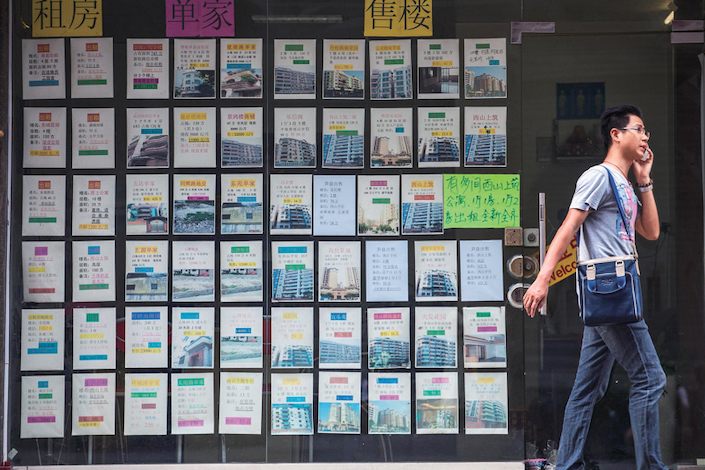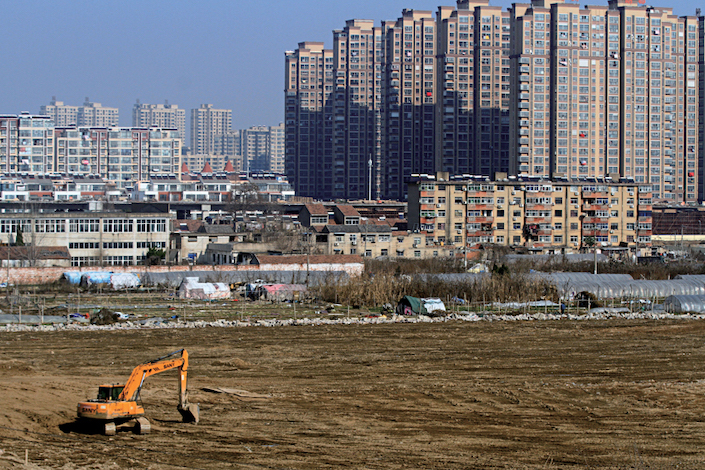On Oct. 7, dozens of homeowners gathered at the sales office of a new residential development in Nanyang demanding refunds. The value of their homes depreciated at least 30% in less than a year since purchase. The average price of housing in a neighboring project by the same developer dropped more than 40%.
Nanyang, a city of nearly 10 million people in central China’s Henan province, is a microcosm of the real estate market in China’s third- and fourth-tier cities. In the past few years, with large inflows of migrants from rural areas into smaller cities like Nanyang, developers such as China Evergrande Group and Country Garden Holdings Co. Ltd. rushed in to build housing.
Then the central government, concerned about risky overheating in the property sector, moved to cool things down. Since President Xi Jinping declared in 2017 that “houses are for living in, not for speculation,” policymakers have imposed a series of measures to limit rampant borrowing by developers and tighten standards for mortgage lending. The real estate sector’s industrywide chill reflects those policies as the world’s most populous nation still faces a housing shortage, industry experts say.
Since the government curbed their borrowing ability last year, developers are experiencing a sharp drop in home sales, adding to their financial burdens. Since September, nine developers’ credit ratings or outlook have been cut about 20 times. The debt crisis that may lead to the collapse of Evergrande, one of the country’s largest developers, has heightened market concerns.
As a result, developers have lost their appetite for real estate, which will put fiscal pressure on local governments that rely heavily on land sales. That pressure will in turn constrain funding for infrastructure and weigh on economic growth.
Housing chill across China
Meanwhile, sales of existing housing have cratered under pressure on mortgage loans imposed by multiple cities. A broker in Hunan province told Caixin that his company’s sales of pre-owned housing plunged to 30%–40% of sales in the same period last year.
 |
|
Developers now offer brokers commissions of as much as $15,500 a unit to sell homes. |
The sector is feeling the pinch of reference price mechanisms set by city governments that limit the amounts that financial institutions can loan to homebuyers. In February, Shenzhen set reference prices for pre-owned properties in 3,595 residential compounds and prohibited banks from processing loans at amounts higher than the reference prices. Since then, sales of pre-owned homes in the city declined every month to 1,765 units in September from a normal range of 5,000 to 8,000 a month.
Other provincial capitals like Sanya, Chengdu and Xi’an followed Shenzhen. Reference prices of most of the pre-owned properties to be included in the Guangzhou system were cut by 30%–50% from market prices. Many sellers found the reference prices “unacceptable” and have taken a “wait-and-see attitude,” which led to a sharp decline in transactions, said Huang Tao, manager at Centaline Property Agency in Guangdong.
At a recent new project in downtown Guangzhou, where new units routinely sold out in minutes, the developer now offers brokers commissions of as much as 100,000 yuan ($15,500) a unit. China Vanke Co. Ltd., a top-three developer that never used to worked with brokers, recently signed agent agreements for two projects in Shenzhen, according to a local broker.
Broker commissions are a key indicator for the housing market, with higher commissions indicating that developers can’t sell projects on their own, said Deng Haozhi, director at the National Real Estate Manager Alliance.
The top 100 developers reported a combined 759.6 billion yuan ($118 billion) in sales in September. That was down 36.2% year-on-year, compared with a 20.7% slide in August, according to a report by real estate data collector China Real Estate Information Corp. (CRIC). Traditionally, September and October are a high season for property sales. During the National Day holiday in the first week of October, new home sales fell 33% year-on-year in major cities monitored by China Index Academy.
Shrinking appetite for land
Meanwhile, local governments’ land auctions received a cold response. About 27% of land parcels up for sale failed to attract bidders in September, according to CRIC data, the fourth straight month the figure rose. Local government income from land sales will fall next year after expanding at a slower pace this year, ratings giant Moody’s Investors Service Inc. predicted.
Some cities such as Shanghai and Hangzhou in eastern China’s Zhejiang province, recently halted several planned land auctions. Less than half of the land in the latest auctions in Guangzhou city was sold, and very few lots topped the asking price.
 |
| Several cities recently halted planned land auctions as developers lost appetite for land. |
Among land buyers in Guangzhou’s recent sale, most are state-owned developers, including China Overseas Property Ltd., Guangzhou Pearl River Industrial Development Holdings Co. and Yuexiu Enterprises (Holdings) Ltd. Such players rarely participate in land auctions and buy to boost confidence only when the market is very depressed, said real estate expert Deng.
The real estate sector is pessimistic, and survival is the priority, said Lu Ting, chief China economist at Nomura Holdings Inc. There will be fewer and fewer developers able to buy land, and the number of land purchases will be further reduced, he said.
Broader impact on economy
Worries on the cooling property industry’s impact on the broader economy have raised debate about whether Beijing will loosen its policies to avoid a severe hit to the economy.
Louis Kuijs, head of Asia economics at research firm Oxford Economics Ltd., said the slowdown in the residential real estate sector will drag down China’s economic growth in the fourth quarter to 3.6% year-on-year from 5% previously estimated.
To stabilize rapidly cooling property markets, some local governments have begun taking measures to ease liquidity pressure on developers and shore up demand. Earlier this month, the northeastern city of Harbin issued a series of measures including relaxed restrictions on developers’ pre-sales revenue and on subsidies for certain first-time homebuyers.
Some local governments directed developers not to cut prices too much. Local governments in at least seven cities — including Yueyang in Hunan province and the Hebei province cities of Tangshan and Zhangjiakou — have held discussions with property companies or set limitations on discounts.
Financial regulators have told some major banks to accelerate approval of mortgages in the last quarter. Lenders were also permitted to apply to sell securities backed by residential mortgages to free up loan quotas, easing a ban imposed early this year, according to people familiar with the matter.
No change in policy
In a Sept. 29 report, Tianfeng Securities said it expects real estate sales and financing to get some relief in the fourth quarter.
But most macroeconomic researchers say the key tone of the central government’s “houses are for living in” policy won’t change in the long run, and it’s difficult to reverse the sector’s long-term cooling trend.
Multiple people close to financial institutions or regulators told Caixin that there won’t be a fundamental shift in the real estate financing policy. China’s tightened management mechanism for banks’ real estate lending will stay in place as part of normalized policy, the central bank said last month in its 2021 financial stability report.
The mechanism, first introduced in December 2020, capped banks’ outstanding property loans as a proportion of total loans and their ratio of outstanding mortgages to total loans.
At a September meeting, the central bank and the China Banking and Insurance Regulatory Commission (CBIRC) called for financial institutions to cooperate with local governments to maintain stable and healthy development of the housing market and to safeguard the rights and interests of consumers.
China’s government has insisted that property not be used as a short-term stimulus for the economy, said Zou Lan, head of the financial market department at the People’s Bank of China at a news briefing Oct. 15. The central bank asked lenders to keep credit to the real estate sector “stable and orderly,” he said.
Property investment slumped recently after some developers faced credit problems, but this is a normal market phenomenon, Zou said. Some banks have misunderstood macroprudential policies regarding the property sector, he said.
The government is unlikely to ease its curbs on the property sector, despite recent speculation, Nomura’s Lu said. The possibility of reversal in Beijing’s hawkish stance on the property sector in the near term is small, Lu said. This round of tightening policy reflects unprecedented determination by the central government, and local governments face relatively less resistance in implementation, he told Caixin.
When the government will reverse its restrictive policy will depend on the scope of the sell-off of Chinese developers’ dollar bonds, how much the sell-off affects the domestic bond market and the degree of local governments’ fiscal difficulties from less land sale revenue, Lu said.
But overall, Beijing’s determination to reduce dependence on real estate investment will not change easily, Lu said. Even if there is some policy easing, it will be difficult to touch the core policies, including the notable “three red lines” policy, which determines the bottom lines for developers’ liabilities-to-assets ratio, net debt-to-equity ratio and cash-to-short-term debt ratio, Lu said.
Lu also suggested that the government needs to do a better job of addressing the housing problem in the medium and long term, such as expanding the supply of government-subsidized housing and land and pushing forward the property tax to increase local governments’ fiscal revenue for affordable housing projects.
Peng Qinqin and Zhang Yuzhe contributed to this report.
Contact reporter Denise Jia (huijuanjia@caixin.com) and editor Bob Simison (bobsimison@caixin.com)
Download our app to receive breaking news alerts and read the news on the go.
Get our weekly free Must-Read newsletter.
You've accessed an article available only to subscribers
VIEW OPTIONS
https://ift.tt/3prq7n5
Business
Bagikan Berita Ini














0 Response to "Cover Story: How China's Housing Market Landed in the Deep Freeze - Caixin Global"
Post a Comment